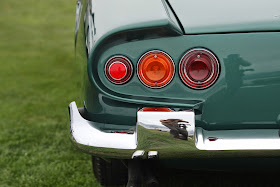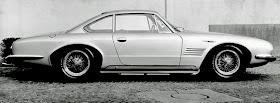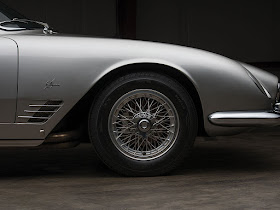The Maserati 5000 GT were thirty-four 2-door, 2-seater coupé automobiles, made by Maserati of Italy. It was truly a car 'Fit for a King', for it was the Shah of Persia, now Iran, who instigated the making of this true supercar. In 1958 the regulatory body of motor sport, the FIA, decided to reduce the maximum engine size for the World Sportscar Championship to 3-litres. Maserati, who had had a real championship contender in the 450S, were left with many 5-litre V8 blocks on their hands.
During a visit to Livorno in 1958, Reza Khan Pahlavi, the Shah of Persia and a great Maserati enthusiast, had apparently been greatly impressed with the performance of the 3500 GT. His interest convinced Maserati owners, the Orsi family, to build a rather special Gran Turismo sports car combining the 3500 GT chassis with the race-bred V8. This car became known as the 5000 GT 'Shah of Persia' (chassis #103.002) and gave rise to a limited production of 'custom made' 5000 GTs designated Tipo 103 by the factory.
The term 'custom made' can easily be applied for no two cars were identical even if these differences were only minor. Some of the world's famous, richest and most influential people wanted to own a 5000 GT, most notably the Aga Khan, Italian industrialist Giovanni Agnelli, American multimillionaire sportsman Briggs Cunningham, British film actor Stewart Granger, Ferdinando Innocenti maker of Lambretta motor scooters and President Adolfo Lopez Mateos of Mexico from 1958 to 1964. (wikipedia & maserati-indy.co.uk)
The term 'custom made' can easily be applied for no two cars were identical even if these differences were only minor. Some of the world's famous, richest and most influential people wanted to own a 5000 GT, most notably the Aga Khan, Italian industrialist Giovanni Agnelli, American multimillionaire sportsman Briggs Cunningham, British film actor Stewart Granger, Ferdinando Innocenti maker of Lambretta motor scooters and President Adolfo Lopez Mateos of Mexico from 1958 to 1964. (wikipedia & maserati-indy.co.uk)
Maserati 5000 GT by Touring (4)
Carrozzeria Touring developed the superleggera tubing and aluminum body of the first 5000 GT coupé. The second car (chassis #103.004), also by Touring, was purchased by Basil Read, a South African businessman and owner of the Kyalami race circuit. The first two 5000 GTs were powered by an engine virtually identical to that which powered the 450S race car. The only modifications made were a reduction in the compression ratio and a slightly larger bore resulting in an engine capacity of 4935 cc against 4477.9 cc for the 450S. These changes reduced power output from 400 bhp @ 7200 rpm to a more civilised 340 bhp @ 5500 rpm. Touring made two more 5000 GT after. (maserati-indy.co.uk)
Maserati 5000 GT by Allemano (22)
In 1961, Maserati sent examples of the uprated 5000 GT chassis to all of Italy's carrozzerie, resulting in a wide variety of coachwork for prospected customers to choose from. Most of them eventually settled on the design penned by Giovanni Michelotti for Allemano. Known as the 'Indianapolis', this perhaps was the most understated of all 5000 GT designs. Of the 34 Maserati 5000 GTs built, Allemano clothed 22 of them. (maserati-indy.co.uk & supercars.net)
In 1966, one of the damaged Allemano 5000 GT (chassis #103.022)
was 're-bodied' by Vignale to become the first Maserati Mexico prototype.
Maserati Mexico Production Model (1966-72)
was 're-bodied' by Vignale to become the first Maserati Mexico prototype.
Maserati Mexico Production Model (1966-72)
Other builders of the 500 GT were Pietro Frua (3), Carrozzeria Monterosa (2), Pinin Farina (1), Ghia (Sergio Sartorelli) (1) and Michelotti (1). Production of the revised 5000 GT effectively ceased in 1964. This really was the end of an era, as all subsequent Maseratis were 'mass' produced, when demand allowed. (ultimatecarpage.com & wikipedia)
Maserati 5000 GT by Frua (3)
Maserati 5000 GT by Monterosa (2)
Maserati 5000 GT by Pinin Farina (1)
Maserati 5000 GT by Ghia (1)
Maserati 5000 GT by Bertone (1)
Bertone also made a 35th 5000 GT, but the car had a different chassis (#104.004)
and engine. Purists don't qualify it as a true 5000 GT.
and engine. Purists don't qualify it as a true 5000 GT.







(Photos from ultimatecarpage.com, maserati-indy.co.uk, bonhams.com,
simoncars.co.uk, ruotevecchiedb.altervista.org, gieldaklasykow.pl, carstyling.ru,
maserati-alfieri.co.uk & clasicosalvolante.es)





.jpg)
.jpg)
.jpg)
.jpg)
.jpg)

.jpg)


.jpg)




























































.png)
.png)
.png)
%2Bcopy.png)
.png)
.png)
.png)
.png)




























































.jpg)
.jpg)



.jpg)


















